Exit interview: Mark Scott on digital innovation, media maelstroms and the future of the ABC
ABC managing director Mark Scott steps down this week after a decade which has left the public broadcaster transformed. He spoke to Nic Christensen about leading that change, dealing with critics 'hijacking' the conversation and the lessons commercial media can learn from Aunty.
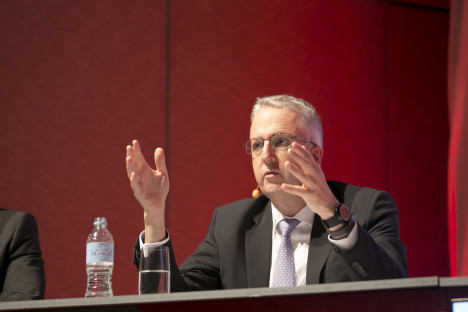
“I do regret the public discourse on the ABC,” says outgoing managing director, Mark Scott, as we begin the interview.
After 10 years in the role Scott is in a reflective mood and appears eager to admit that he is also slightly perplexed at why, at times, under his stewardship the ABC has been so hammered by sections of the press.
“We still have overwhelming public popularity – 85% of the public believe we provide a valuable or very valuable service. But I suppose my question is if you followed the media commentary there seems to have been a disproportionate focus and commentary on 2% of programming.
“At times I feel the conversation gets hijacked by some who simply want to see everything in an ideological or polemical way,” he says, his frustration clearly apparent.
Selling the ABC’s message
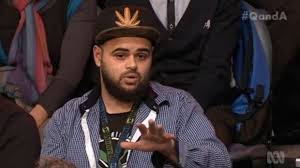
Mallah’s appearance on Q&A dominated headlines for weeks last year.
That accusation of ‘hijacking’ is a strong one from Scott. But in a way it typifies the more confident ABC which has emerged under his tenure.
Asked which were the 2% of shows that get all the focus, he replies: “It’s really 7.30, Insiders, Q&A – but that’s about it.
“Even with politicians in a way we can lose sight of the big picture which is the enormously important role that the ABC is playing every day in telling Australian stories, hosting Australian conversations and celebrating Australian culture. That’s the really important role of the ABC.”
The media and political storm that erupted after last year’s appearance on Q&A of former terror suspect Zaky Mallah is a prime example of that.
“I think Q&A is an obvious one,” he adds. “I have said publicly that I thought it was deserving a day’s attention. The ABC responded pretty quickly. It just seemed to drag on and on, for reasons I still don’t fully understand.”
While Scott has given many speeches and been outspoken on the future of media and media policy, does he feel he has done enough to sell the ABC’s message?
“That’s a question I ask myself, from time to time,” he concedes.
“I sometimes think we need to do a better job in making it very clear (what we do) and celebrating all the achievements of the ABC.”
The role of a public broadcaster in a fragmented media world
The last decade has arguably been the most disruptive ever in terms of the media, with broadcasters and publishers struggling to get to grips with massive changes in technology, and expectations.
“These have been days of great tumult and change in the media sector. That has been driven by the startling changes in technology, some of which were unpredicted. It changed audience behaviour in markets,” notes Scott.
While the public broadcaster, referred to fondly as Aunty, has traditionally been seen as bureaucratic and slow to change, Scott says his staff have “responded to those changes and challenges well”.
“I’m really pleased with the efforts of the ABC staff in rising to the challenge of the digital era,” he adds.
“There are two different things that are linked: there is no doubt that we have expanded our services and been innovative with a good suite of multi-channels in radio and TV, and we innovated with iView and created ABC News 24.”
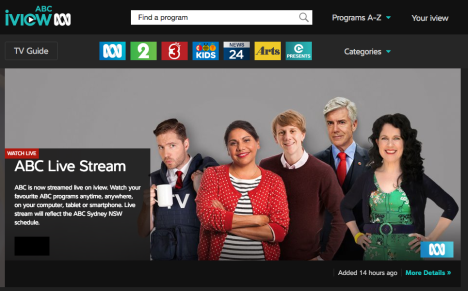
Scott cites iView as one of the innovations he is most proud of.
“I think there are some people who might have thought organisationally and culturally we were quite conservative,” he adds. “But we have shown that we can change, that we can be innovative.
“You can create a whole lot of outlets for your content but they are largely meaningless unless the quality of your content is high. I’m really pleased about how we have kept the quality high while also being innovative about finding new ways to deliver it to audiences.”
Unlike commercial media, the ABC has the luxury of taxpayer funding and has not needed to find revenue models to make these advances and changes pay.
But critics argue that under his watch the ABC has been too aggressive in the digital space and is now competing with commercial media in a way that undermines its business models – the argument being it is harder for the likes of News Corp and Fairfax to convince consumers to pay for content when the ABC provides it for free.
However, Scott has a different point of view on this, arguing instead the ABC can provide a “proof of concept” in new areas, citing its work in on-demand viewing for TV content.
“iView was an industry leader and what we did with it was to show that there was a market and an audience that wanted to watch television in a way that was not constrained by the schedule,” says Scott.
“In a way it is a good role for the public broadcaster to provide ‘proof of concept’. We have done that with quite a lot of our digital activities. Similarly the work we are doing with our radio app now will be pioneering.”
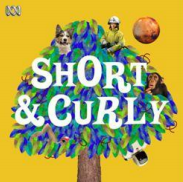
Short & Curly is one of the ABC’s newest podcasts.
Podcasting is another area the broadcaster has led the way in, with 135m podcasts downloaded last year, far more than any other Australian media outlet.
“The ABC was a global pioneer in podcasting,” says Scott. “It’s a good thing for the public broadcaster to do. If you don’t have to find a pathway to profitability because of your business structure (it allows you) to be able to innovate and showcase a pathway and that is a good thing.”
The future of ABC funding
The public broadcaster has also been under funding pressures after the Abbott Government reneged on promises in the 2013 election campaign not to cut funding to the ABC, leading to hundreds of job cuts across a range of services.
The ABC is currently in talks with the government over its triennial funding and despite recent threats that more jobs could go Scott is optimistic that the government will not force his successor, former Google executive, Michelle Guthrie, to cut more jobs.
“I think we have had a good hearing at senior levels of government. The outcome of that won’t be known until a couple of days after I’m gone,” he says, noting the result will be in the upcoming Federal Budget. “I am hopeful we will get a good result.”
The ABC has also reined back some of its commercial operations, last year announcing it would seek to close its 50 ABC Shops and 78 ABC Centres in other retail outlets with around 300 staff impacted after the stores posted a $30.8m loss.
While the collapse in DVD and CD sales heralded the end for the physical stores, the wider ABC Commercial division still posted a $4.5m profit in 2014-15. So if the government does cut its funding is there scope to ramp up its own commercial operations as the BBC has done in recent years?
“The ABC needs to look at its commercial activities and whether it can extract additional value from what it creates,” he says, echoing remarks made by his successor Michelle Guthrie when she was announced in the role in December.
Scott is quick to add: “We also shouldn’t lose sight of the fact that the public is already paying for the ABC; it pays through its taxes, and so when some people want the ABC to start charging what they are saying is that the ABC should start charging taxpayers twice.
“For the foreseeable future, unless there is a radical shake-up imposed by government, the overwhelming amount of funding to the ABC will come from government.”
Tangling with Rupert Murdoch’s News Corp
Rupert Murdoch’s News Corp is perhaps the most vocal critic of public broadcasting, with papers in the UK and Australia continually highlighting perceived inefficiencies and threats the taxpayer-funded BBC and ABC pose to commercial media outlets, especially in the digital age.
It was Murdoch papers, in particular national broadsheet The Australian, which led the charge over the Zacky Mallah Q&A fiasco. So how does Scott feel about the treatment meted out to him and the organisation by News Corp?

Some of the front pages run in the Murdoch press during the Q&A controversy.
“I must say I take none of it personally,” Scott reflects. “At time I have run in to some columnists who are very aggressive (in print) and they almost give you a smile and nod. It’s a bit like a set piece theatre.
“The thing I would say about News Corp, and this is something which came through the work Nick Davies did for the Guardian around phone-hacking, for all the talk about an ideological agenda being driven at News it is all about the business.”
Scott argues News’ renewed focus on the ABC in recent years has, in part, been a reflection of the convergence of media.
“When I was at Fairfax there were bitter attacks on us by News Corp and I think there have also been consistent attacks on the ABC and we can trace it back to the 1930s,” says Scott.
“However, I think for whatever reason, when they were in newspapers and we were in broadcasting there wasn’t too much shared space being occupied. Clearly now in the digital era there is more shared space.”
Does Scott believe that it is part of a broader co-ordinated agenda?
“News has certainly cleared its throat around the world and attacked public broadcasters, Google and others who are operating in its space,” he says. “You could make an argument that at times News Corp just wants to be an absolute dominant player in any market that they operate in.”
But Scott says overall he is not concerned for the future of the broadcaster despite the attacks: “The ABC and public broadcasting is here to stay in the digital era.
“That’s what the public supports and thats what the public wants.”
Lessons in leading the ABC
I’m interested in what he learned in the role over the past decade. Often under a microscope, Scott says he has often prided himself on being “the calmest person in the room”.
“In a way, you have to realise is that media firestorms come and go,” he says. “You can find yourself in circumstances where, through no fault of your own or through an unusual set of events, there is an extraordinary level of media scrutiny.
“It won’t always be like that and I think it’s important to reflect on what are the causes what are things we can do now, and to be purposeful in finding a solution and move on.”
On his own experiences he reflects: “I feel like we gave it a good shake. Personally for me it is time to move on and I’m sure there are great days ahead for the corporation under Michelle’s leadership.”
What advice has he given to his successor Guthrie? “Michelle arrives with her own skills and her own experience,” he says, referring to Guthrie’s background at Google, and prior to that, BSkyB.
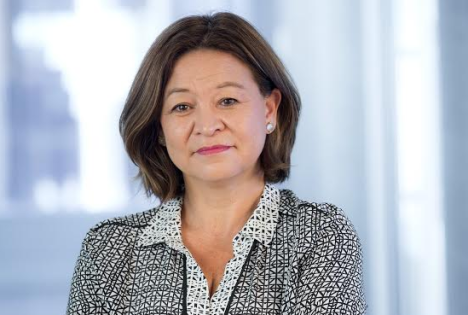
Guthrie to take the reins of the ABC next week.
“There is no doubt that the level of scrutiny and engagement around the ABC is quite extraordinary,” he says, describing the magnifying glass that the MD’s role is under.
“I said to her: ‘Think of the Kremlin, think of the Vatican; you get that kind of extraordinary scrutiny over everything you say and do in a role like this’.
“It is, in part because of the role the ABC plays in the life of Australians. It is a very complex set of stakeholder relationships.”
Guthrie had a rude awakening to the scrutiny her every word will be put under after coming in for criticism after her first interview after taking the role, when she appeared to leave the door open to the potential of advertising on the ABC.
Scott won’t be drawn on her remarks but notes more broadly: “I don’t think anything can really prepare you for that level of scrutiny and engagement. You just have to pick it up as you go along.”
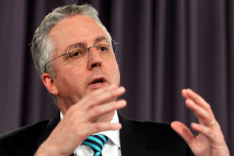
Scott: you have to just pick up the rhythm and understanding over time.
How did he pick it up? “I had the Fairfax role and I had been around politics,” he says referring to his time working in a senior editorial role at Fairfax and on the staff of politicians Nick Greiner and Terry Metherell.
“I suppose I drew on skills I had to talk and to engage and to debate where necessary. In a way you have to just pick up that rhythm and understanding over time.”
Scott says he is undecided about what he next move will be and says he is keen to take some time to think about it.
“I am going to do nothing for a little bit,” he says. “I have had some ideas floated by me but I am still just thinking. I have had some good advice that after a job like this you will exercise best judgment about what you want to do next by pausing and reflecting a bit – rather than lunging at the first thing that floats by.
“In a way I’m not sure it will be in media, but I have had a great media job here and in fact I have had two great media jobs at senior levels.”
Even if he is unlikely to pursue his career in the media Scott is keen that his legacy is seen as one of digital transformation.
“What we have is here is a story of digital transformation,” he says. “Taking a big organisation, that some said would be reluctant to change, and really working with the team here for it to be a leader in digital change and transformation.
“There are lots of organisations who are going through this we will see what emerges over time.”
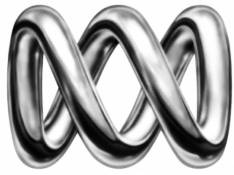 Are there lessons that can be learnt from the ABC’s story for commercial media, particularly around pace of change?
Are there lessons that can be learnt from the ABC’s story for commercial media, particularly around pace of change?
His reply is simple: “There is line by the American researcher Gary Hamel who asked ‘are you changing/is your company changing as fast as the world outside is changing?’
“I always found that pretty sobering and whenever I reflected on that I always wanted to speed up the rate of change.”
Whatever your opinion of Scott’s tenure at the ABC it cannot be denied he leaves the organisation much changed from the day he took over.
Nic Christensen is media and technology editor of Mumbrella.




Incredible:
He has learned nothing about the ABC’s problems during his stint there. Indeed, he fails to even acknowledge them.
Good riddance.
User ID not verified.
The word Mr. Scott is BIAS, you allowed the ABC to be hijacked by the left, you bused people in from left supporting suburbs for your Q&A programme, confirming in many viewers eyes your support of one side of politics. Many of us would not mind of the government halved you funding, as you only talk to half the nation.
User ID not verified.
It still does address the issues of “everyone’s” ABC becoming totally eastcoast focused with all the money spent there on exorbitant executive salaries for the ‘stars’ while regional stations and networks and the really credible ABC workers continue to subsist on average wages that are close to exploitation. Still one set of rules for the rich and another for the workers at dear old Aunty – appalling.
User ID not verified.
@Wonka. You clearly do not understand politics. I am guessing that you are part of the pitch fork, rooting tootiing, ‘believe whatever is written in the Terrorgraph’ brigade. Y9ou probably use the term ‘leftist’ too. Oh dear.
(I am central btw.)
User ID not verified.
@Wonka
Whilst you probably live your life cursing the likes of Rudd and Gillard for being ‘loony lefties’, you might be surprised to see that their party (and indeed they) are certainly right of centre:
http://www.politicalcompass.org/aus2013
User ID not verified.
Oh Dear, that has nothing to do with bias on the ABC, you live your life basking in a false Utopia. Scott oversaw the most radical shift in bias on a publicly owned national media in its history, his legacy is a medium that does not run on impartiality, as its charter says it should.
User ID not verified.
Scott is a political player rather than a manager. He played to the unions at Fairfax and at the ABC, knowing that they could provide favourable breezes at his back. He claims great digital results yet the ABC web sites drew editorial staff into opinionated content that has infected their work. And the streaming platform is not at all a best of breed. Radio’s diversity and expertise has suffered together with the local news across the nation that has been its hallmark.
Finally you might say that some recent drama has been good, but it is also true that abc tv has a totally boring excess of poor comedy and bbc cast off.
Scott was lucky to get the job. I’m hoping his successor will get stuck in to the basic quality issues and value for money. But I’m not holding my breath.
User ID not verified.
@Wonka
You are either ignorant or you are choosing to tow a particular line. What threat do you perceive from a media outlet that reports facts, backed up with evidence? When people mention the word ‘science’, does it send a shiver down your spine?
User ID not verified.